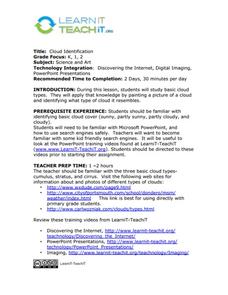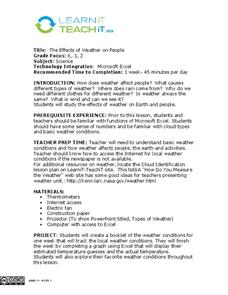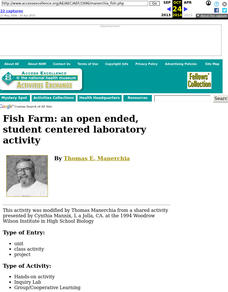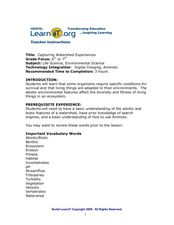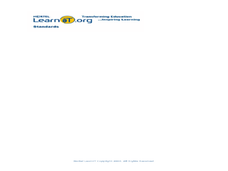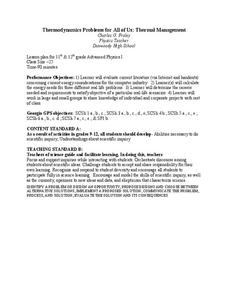Curated OER
Lesson: Litter Hunt
Students examine the issue of littering. In this waste management lesson, students discover what littering is and how it affects the environment.
Curated OER
Vermiculture Food Waste Compost Program for Touchstone School
Students explore the advantages of composting. In this recycling lesson students complete a worm compost project and collect food waste to feed them.
Curated OER
Fashion Forward, Fashion Functional
Middle schoolers consider the implications of waste. In this waste streams lesson, students learn what waste streams are and identify their impact on the environment. Middle schoolers also recycle waste materials to create functional...
Curated OER
Fishing For The Future
Students participate in a simulation using M&M's that highlights Garrett Hardin's concept of the "tragedy of the commons." They use the activities to study sustainability issues in the fishing industry.
Curated OER
Cloud Identification
Students study types of clouds. In this earth science lesson, students read the book The Cloud Book. Students use photos to examine each type of cloud and visit suggested websites.
Curated OER
How Do Plants Grow?
Students investigate plant growth. In this plant growth lesson, students investigate what would happen to plants if they did not have water and sunlight. Students conduct experiments to determine what plants need. Students create a...
Curated OER
Bioethics: Tool for Portfolio and Performance Assessment
Students, in cooperative studying groups, assume the affirmative or negative position of a particular issue (premise). They research the issue and participate in a debate. In addition, they write essays to complete a portfolio entry.
Curated OER
The Effects of Weather on People
Students discover the causes of different types of weather and it's effect on society. In this environmental lesson, students utilize the Internet to examine cloud types, normal weather conditions and the type of weather considered...
Curated OER
Climate Mime-it
Young scholars pantomime new climate vocabulary words. In this climate lesson, students go over new vocabulary words and their meanings. Young scholars form groups and pantomime these word's definitions.
Curated OER
Fish Farm: an open ended, student centered laboratory activity
Students are contacted by a fictitious company which raises tropical fish to do basic research for them so that they might keep their production costs down. They need to know the optimum salinity in which to hatch the brine shrimp that...
Curated OER
Capturing Watershed Experiences
Students observe organisms found in the water. In this lesson on organisms, students collect water from local streams and tributaries in order to study the organisms found in the water. As a culminating activity, students create a...
Curated OER
To Drink or Not to Drink?
Second graders compare water conservation issues as they impact the past, present, and future in Nevada. For this water conservation lesson, 2nd graders perform and ice experiment to comprehend water collection differences. Students...
Curated OER
A Generation that Cares: Saving our Environment!
Young scholars discover the dangers posing our environment. In this environmental awareness lesson, students investigate problems like global warming and pollution and discuss ways their generation can solve these issues. Young...
Curated OER
The Great MPA Debate
Students study the 'Marine Protected Areas' process. In this ocean lesson students work in groups, conduct research and present it to the class.
Curated OER
Rate Determining Step and Catalysts
Students investigate the rate determining step in a chemical reaction and how catalysts effect reactions. In this rate determining step and catalyst lesson, students work in groups to perform 5 tasks. They rotate each task and time how...
Curated OER
Thermodynamics Problems for All of Us: Thermal Management
Pupils evaluate current literature on the Internet and in handouts about the energy considerations for the computer industry and calculate energy needs for real life problems. Working in groups, they present the problem they researched,...
Curated OER
Science: Plate Tectonics, Faults, and Volcanoes
Eighth graders conduct Internet research on plate tectonics, faluts, and volcanoes. In groups, they compile information related to teacher-provided questions. Students write papers detailing their findings and make oral presentations...
Curated OER
Managing Nutrients in Livestock Manure
Livestock managers reinforce math and science skills while learning about the nutrients found in manure. They predict which animal produces the largest amount and which animal's manure contains the most nitrogen. Finally, they compare...
Curated OER
Debates in Human Genetics
Students examine case studies involving human genetics. They research the case and determine possible problems to the issue. Students write essays supporting their opinion. They debate the ethical issues.
Curated OER
Story Time
Ninth graders watch soap operas online. In this English lesson, 9th graders explore the story elements of the soap opera. Students write a journal on their own interpretations of characters.
Curated OER
Scientific Approach to Forest Management
Students use wireless laptop computers to collect, store, communicate, and organize data from the 1999 Jasper Fire area. They collect data in the field and compare it to student-collected data from prior years to develop conclusions...
Curated OER
Integrated Pest Management
Students compare and contrast the role of the honeybee in nature. They find information by using a variety of resources that could include the internet. Students take part in a paper and pencil formal evaluation with questions that...
Curated OER
Integrated Resource Management
Students identify and analyze the concept of integrated resource management. Then they identify the importance of computers in manufacturing management. Students also identify and define the meaning of acronyms such as CAD, CAM, CIM,...
Curated OER
People Who Work in the Woods
Students study the types of jobs that people can do in the forest. They examine those who study the forest, harvest the trees, and plant trees to renew the forest.






